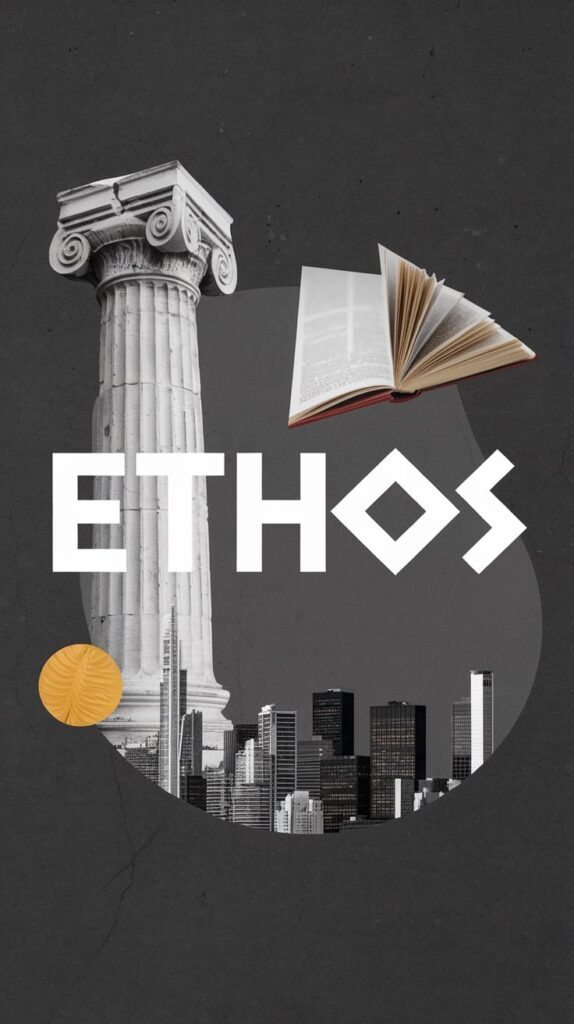Meaning
When diving into the world of literature, understanding the meaning of ethos is crucial for appreciating how authors convey their messages. Ethos, derived from the Greek word for “character,” refers to the credibility and ethical appeal of a writer or character. In literary contexts, ethos establishes a sense of trustworthiness and authority, allowing readers to engage more deeply with the narrative.
read more : Simile and Metaphor – Grammar Beacon

What is Ethos?
Ethos serves as a powerful rhetorical appeal in writing, establishing the character’s or author’s credibility. It encompasses their moral values, expertise, and integrity, influencing how the audience perceives their arguments. Essentially, ethos is about the character’s character—how they present themselves and how trustworthy they appear to the reader.
- Key Components of Ethos:
- Trustworthiness: Does the character or author demonstrate reliability?
- Expertise: What qualifications or experiences do they possess that lend credibility to their claims?
- Moral Values: Are their arguments grounded in ethical considerations?
The Function of Ethos in Writing
Understanding the function of ethos in writing enhances our appreciation of its role in literature. Ethos does more than establish credibility; it plays several vital roles in persuasive writing.
Building Trust with the Audience
One of the primary functions of ethos is to build trust. When characters or authors convey honesty and integrity, readers are more likely to accept their viewpoints. For instance, a character with a reputable background may persuade readers more effectively than one lacking credibility.
read more : Or vs Nor – Grammar Beacon
Influencing Persuasion
Ethos also influences persuasion. An author who effectively communicates their credibility can sway readers’ opinions. When a character shares personal experiences or demonstrates expertise, it strengthens their argument, making it more compelling. This interplay between ethos and persuasion is crucial in literature.

Creating Relatability
By sharing values and experiences, writers can create relatability. A character who openly discusses their struggles or ethical dilemmas fosters a deeper connection with the audience. This connection makes their message resonate on a personal level, enhancing the overall impact of the narrative.
Ethos Examples in Literature
Examining examples of ethos in literature can provide insight into how this rhetorical appeal manifests across different works. Here are several notable examples that illustrate the concept effectively.
read more : Plural of Foreman – Grammar Beacon
Ms. Williams in “The Education Solution” by Sara Thomas
In “The Education Solution,” Ms. Williams stands as a powerful embodiment of ethos. As an experienced educator, she advocates for reforms in youth education based on her firsthand observations. Her compassion for her students and commitment to their success builds her credibility.
- Ethical Appeal: Ms. Williams’ dedication to improving educational systems showcases her ethical values. She demonstrates understanding and empathy, making her a relatable character for readers.
Prime Minister Reed in “The Road to Peace” by David Johnson
Prime Minister Reed in “The Road to Peace” showcases the essence of ethos through his leadership during conflict. His personal experiences with the consequences of war allow him to speak authoritatively on matters of peace.
- Ethical Appeal: Reed’s moral convictions and empathy for those affected by war establish him as a trustworthy leader. His narrative compels readers to consider the importance of peacebuilding efforts.
Dr. Roberts in “The Cure” by John Smith
In “The Cure,” Dr. Roberts serves as a prime example of ethos through his medical expertise and dedication to patient care. His extensive experience in the field of medicine enhances his credibility.
read more : Arised or Arose: What’s the Correct Past Tense of Arise? – Grammar Beacon
- Ethical Appeal: Dr. Roberts’ commitment to ethical practices in healthcare resonates with readers. His portrayal emphasizes the importance of compassion in medicine, reinforcing the idea of trustworthiness.
Character A in “The Importance of Dialogue” by Jane Doe
Character A in “The Importance of Dialogue” exemplifies ethos by championing free speech, even amidst political disagreements. This character’s unwavering commitment to open dialogue highlights their ethical integrity.
- Ethical Appeal: By standing firm in their beliefs, Character A fosters a connection with readers who value freedom of expression. This relatability enhances the character’s credibility.
Dr. Hanson in “Call to Action” by Jane Kramer
Dr. Hanson in “Call to Action” demonstrates ethos through her extensive research on climate change. Her qualifications and commitment to raising awareness strengthen her ethical appeal.
- Ethical Appeal: Dr. Hanson’s passion for environmental issues and her expertise create a persuasive narrative. Readers are more likely to engage with her arguments because of her established credibility.
Mr. Thompson in “The Honorable Business” by Timothy Clark
In “The Honorable Business,” Mr. Thompson showcases ethos through his dedication to ethical business practices. His journey from modest beginnings to success is grounded in integrity and hard work.
- Ethical Appeal: By sharing his story of perseverance, Thompson connects with readers who value ethical entrepreneurship. His character embodies the principles of trustworthiness and diligence.
Senator Patel in “The Fight for Reform” by Jack Corner
Senator Patel in “The Fight for Reform” illustrates ethos through his understanding of working-class struggles. His personal experiences lend credibility to his arguments for social reform.
- Ethical Appeal: By advocating for policies that reflect his awareness of social injustices, Senator Patel resonates with readers. His character serves as a voice for those seeking change.
Related Terms with Ethos
To fully grasp the concept of ethos, it’s essential to understand its relationship with related rhetorical appeals.
Pathos: The Emotional Appeal
Pathos focuses on emotional connection. While ethos establishes credibility, pathos aims to evoke feelings that can persuade an audience. For instance, a character sharing a heart-wrenching personal story may elicit empathy, enhancing the persuasive nature of their message.

Logos: The Logical Appeal
Logos involves logical reasoning and factual arguments. It complements ethos by providing a rational foundation for persuasive writing. While ethos builds trust, logos presents the facts needed for a compelling argument. Together, ethos, pathos, and logos create a well-rounded persuasive strategy in literature.
The Importance of Ethos in Literary Analysis
Understanding ethos is crucial for literary analysis. It not only enriches our comprehension of characters and narratives but also enhances our appreciation of the authors’ intentions. By exploring how ethos functions in literature, readers can better understand the ethical dimensions of storytelling.
Analyzing Character Development Through Ethos
Examining character development through the lens of ethos reveals how authors craft relatable and trustworthy figures. Characters that exhibit strong ethical principles and credibility often resonate with readers, enhancing the emotional impact of the story.
- Example: In “To Kill a Mockingbird,” Atticus Finch embodies ethos through his commitment to justice and moral integrity. His character’s ethical stance resonates deeply with readers, illustrating the power of ethos in character development.
The Role of Ethos in Themes and Motifs
Ethos can also play a significant role in the themes and motifs present in a literary work. By establishing credibility, authors can effectively explore complex themes, such as justice, morality, and social responsibility.
- Example: In “The Crucible,” characters like John Proctor grapple with their ethical beliefs, showcasing the struggle between personal integrity and societal pressures. This theme is amplified by the characters’ ethos, making the narrative more compelling.
The Interplay of Ethos with Other Rhetorical Appeals
In literature, ethos doesn’t exist in a vacuum. It interacts dynamically with other rhetorical appeals like pathos and logos to create a compelling narrative. This interplay enhances the overall persuasiveness of the text.
Combining Ethos and Pathos
When authors combine ethos and pathos, they create a powerful emotional resonance. For instance, when a character with a solid ethical foundation shares a moving personal story, the audience feels compelled to listen. This combination deepens the reader’s engagement and emotional investment.
- Example: In “The Fault in Our Stars” by John Green, Hazel Grace Lancaster embodies ethos through her intelligence and thoughtful reflections on life and death. Simultaneously, her struggles with cancer evoke deep emotional responses, combining ethos with pathos to create a rich narrative.
Integrating Ethos with Logos
Integrating ethos with logos establishes a rational framework for arguments while simultaneously fostering trust. When an author provides factual evidence alongside credible character insights, the argument gains a robust foundation.
- Example: In “Silent Spring” by Rachel Carson, Carson presents scientific evidence regarding environmental harm caused by pesticides. Her established credibility as a scientist combined with compelling data enhances the persuasive power of her arguments for environmental protection.
Case Studies of Ethos in Famous Literary Works
To further illustrate the impact of ethos, we can analyze how various authors effectively employ this rhetorical appeal in their work. Here are a few case studies that demonstrate the power of ethos in literature.

Harper Lee’s “To Kill a Mockingbird”
Harper Lee’s “To Kill a Mockingbird” is rich with examples of ethos, primarily through the character of Atticus Finch. As a lawyer defending a black man accused of raping a white woman, Atticus embodies moral integrity and justice. His credibility is established through his unwavering principles and commitment to doing what is right, despite societal pressures.
- Impact of Ethos: Atticus Finch’s strong ethical stance resonates with readers, making him a timeless figure of justice and morality. His character serves as a model of integrity, inspiring readers to reflect on their own ethical beliefs.
George Orwell’s “Animal Farm”
In “Animal Farm,” George Orwell utilizes ethos through the character of Old Major, who inspires the other animals to revolt against their human oppressors. Old Major’s wisdom and experience lend him credibility, making his message about equality and justice compelling.
- Impact of Ethos: The ethical appeal of Old Major’s character encourages the other animals to envision a different reality. His credible voice drives the narrativeand serves as a catalyst for change within the story.
Maya Angelou’s “I Know Why the Caged Bird Sings”
In her autobiography, “I Know Why the Caged Bird Sings,” Maya Angelou establishes ethos through her lived experiences. Her narrative voice, shaped by her struggles with racism, trauma, and identity, resonates deeply with readers.
- Impact of Ethos: Angelou’s authenticity and courage in sharing her story create a profound connection with her audience. Her credibility as a narrator enhances the impact of her message about resilience and strength in the face of adversity.
Conclusion
In conclusion, ethos is a vital element in literature, shaping how authors and characters connect with their audience. By establishing credibility through personal experiences, moral values, and expertise, writers can effectively persuade and resonate with readers. The examples provided illustrate the diverse ways ethos manifests, enriching narratives and enhancing the ethical dimension of storytelling.
Final Thoughts on Ethos
Understanding ethos not only deepens our appreciation of literature but also equips readers with the tools to analyze and critique texts. As you explore various works, consider how ethos functions within characters and narratives, and reflect on the ethical implications woven throughout the storytelling.
Related Topics
- How It Feels to Be Colored Me: Literary Devices
- Climax Examples in Literature: Climax vs. Suspense
- Monologue Examples in Literature
- Understanding Ad Hominem: Types, Examples & Functions
- Themes in A Noiseless Patient Spider
- Digression Examples in Literature
By exploring the concept of ethos in literature, readers gain valuable insights into the ethical underpinnings of storytelling. Ethos, alongside pathos and logos, forms the foundation of persuasive writing, making it an essential aspect of literary analysis and appreciation.
In this way, ethos not only enriches our understanding of literature but also encourages critical thinking about the ethical implications of narratives in our own lives. Whether through the struggles of a character or the wisdom of an author, ethos reminds us of the power of credibility in shaping ideas and influencing change.
Expanding the Conversation on Ethos
To deepen the discussion on ethos, consider how it applies in contemporary literature and media. Ethos is not limited to traditional literary forms; it extends to essays, articles, and digital content as well. Understanding how ethos operates in various contexts allows readers and writers to appreciate its significance in today’s world.
Ethos in Digital Communication
In the age of social media and online communication, ethos remains a vital element in shaping public discourse. Influencers, activists, and content creators often rely on their credibility to engage audiences effectively. For instance, a health influencer discussing wellness strategies will need to establish credibility through their expertise or personal experiences.
- Building Ethos Online: To cultivate ethos in digital communication, individuals can share relevant qualifications, personal anecdotes, and engage transparently with their audience. Authenticity plays a crucial role in establishing trust in the digital realm.
The Evolution of Ethos in Literature
As societal values shift, the concept of ethos in literature also evolves. Modern authors often challenge traditional notions of credibility, questioning who gets to speak and whose voices are valued. Diverse narratives reflect varying experiences and ethical frameworks, enriching the literary landscape.
- Example: Contemporary works like “The Hate U Give” by Angie Thomas illustrate how ethos can be constructed from personal experiences related to race and identity. This shift encourages readers to engage critically with the ethical implications of storytelling.
Encouraging Ethical Engagement
As readers and writers, fostering an understanding of ethos can lead to more ethical engagement with literature. By critically evaluating the credibility of authors and characters, we can navigate complex narratives and consider the ethical dimensions of the stories we consume.
- Questions for Reflection:
- How does the author establish their ethos throughout the narrative?
- In what ways do characters embody or challenge ethical principles?
- How do societal values influence the construction of ethos in literature?
By pondering these questions, readers can deepen their engagement with texts, leading to a richer understanding of the ethical implications of storytelling.
Embracing Ethos in Everyday Life
Finally, the lessons learned from ethos in literature extend beyond the pages of books. Understanding the importance of credibility and ethical appeal can influence our interactions in everyday life. Whether in personal conversations, professional settings, or online interactions, embracing ethos can foster trust and meaningful connections.

Building Trust in Relationships
In personal relationships, demonstrating ethos involves being reliable, honest, and consistent. When we embody these qualities, we create a foundation of trust that strengthens our connections with others.
Ethical Communication in Professional Settings
In the workplace, ethos plays a crucial role in effective communication. Professionals who convey their expertise and ethical values can inspire confidence and foster collaboration among colleagues.
Navigating Online Spaces Responsibly
As we engage in digital spaces, being mindful of how we present our ethos is essential. By sharing accurate information and being transparent about our intentions, we contribute to a more trustworthy online environment.
Conclusion
Ethos remains a powerful tool in literature and life, shaping how we connect with others and the stories we tell. By understanding and applying the principles of ethos, we can engage more ethically and effectively with the world around us. Through literature, we can explore the complexities of character, credibility, and moral values, ultimately leading to a richer understanding of ourselves and our society.
As we continue to read and reflect on ethos, let’s carry these insights into our interactions, nurturing trust, empathy, and ethical engagement in all aspects of life. Whether on the page or in our daily lives, ethos empowers us to make meaningful connections and inspire positive change.

James Logan is a seasoned blogger and language enthusiast behind Grammar Beacon. With years of experience in grammar and writing, James shares his expertise through insightful and engaging content. His passion for clear communication and linguistic precision shines in every post, making complex grammar concepts accessible and enjoyable for readers. Follow James for expert advice and tips to refine your writing skills.







